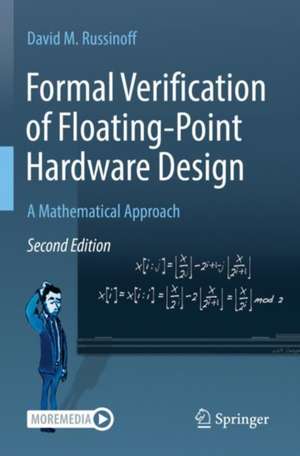Formal Verification of Floating-Point Hardware Design: A Mathematical Approach
Autor David M. Russinoffen Limba Engleză Paperback – 5 mar 2023
As a basis for the formal verification of such implementations, high-level specifications of the basic arithmetic instructions of several major industry-standard floating-point architectures are presented, including all details pertaining to the handling of exceptional conditions. The methodology is illustrated in the comprehensive verification of a variety of state-of-the-art commercial floating-point designs developed by Arm Holdings.
This revised edition reflects the evolving microarchitectures and increasing sophistication of Arm processors, and the variation in the design goals of execution speed, hardware area requirements, and power consumption. Many new results have been added to Parts I—III (Register-Transfer Logic, Floating-Point Arithmetic, and Implementation of Elementary Operations), extending the theory and describing new techniques. These were derived as required in the verification of the new RTL designs described in Part V.
| Toate formatele și edițiile | Preț | Express |
|---|---|---|
| Paperback (2) | 589.33 lei 6-8 săpt. | |
| Springer International Publishing – 25 ian 2019 | 589.33 lei 6-8 săpt. | |
| Springer International Publishing – 5 mar 2023 | 710.81 lei 6-8 săpt. | |
| Hardback (1) | 1001.86 lei 6-8 săpt. | |
| Springer International Publishing – 4 mar 2022 | 1001.86 lei 6-8 săpt. |
Preț: 710.81 lei
Preț vechi: 888.51 lei
-20% Nou
Puncte Express: 1066
Preț estimativ în valută:
136.03€ • 141.49$ • 112.30£
136.03€ • 141.49$ • 112.30£
Carte tipărită la comandă
Livrare economică 15-29 aprilie
Preluare comenzi: 021 569.72.76
Specificații
ISBN-13: 9783030871833
ISBN-10: 3030871835
Pagini: 436
Ilustrații: XXVIII, 436 p. 40 illus.
Dimensiuni: 155 x 235 mm
Greutate: 0.65 kg
Ediția:2nd ed. 2022
Editura: Springer International Publishing
Colecția Springer
Locul publicării:Cham, Switzerland
ISBN-10: 3030871835
Pagini: 436
Ilustrații: XXVIII, 436 p. 40 illus.
Dimensiuni: 155 x 235 mm
Greutate: 0.65 kg
Ediția:2nd ed. 2022
Editura: Springer International Publishing
Colecția Springer
Locul publicării:Cham, Switzerland
Cuprins
Part I - Register-Transfer Logic.- Basic Arithmetic Functions.- Bit Vectors.- Logical Operations.- Part II - Floating-Point Arithmetic.- Floating-Point Numbers.- Floating-Point Formats.- Rounding.- IEEE-Compliant Square Root.- Part III - Implementation of Elementary Operations.- Addition.- Multiplication.- SRT Division and Square Root.- FMA-Based Division.- Part IV - Comparative Architectures: SSE, x87, and Arm.- SSE Floating-Point Instructions.- x87 Instructions.- Arm Floating-Point.- Instructions.- Part V - Formal Verification of RTL Designs.- The RAC Modeling Language.- Double-Precision Multiplication and Scaling.- Double-Precision Addition and FMA.- Multi-Precision Radix-8 SRT Division.- 64-bit Integer Division.- Multi-Precision Radix-4 SRT Square Root.- Multi-Precision Radix-2 SRT Division.- Fused Multiply-Add of a Graphics Processor.
Notă biografică
David M. Russinoff is Senior Principal Engineer at Arm Holdings. He holds a bachelor's degree from the Massachusetts Institute of Technology and a doctorate from New York University, both in mathematics, and a master's in computer sciences from the University of Texas at Austin. He has spent twenty-five years developing mathematical methods of hardware verification, with an emphasis on interactive theorem proving, and applying them in the analysis of commercial designs, especially arithmetic circuits.
Textul de pe ultima copertă
This is the first book to focus on the problem of ensuring the correctness of floating-point hardware designs through mathematical methods. Formal Verification of Floating-Point Hardware Design, Second Edition advances a verification methodology based on a unified theory of register-transfer logic and floating-point arithmetic that has been developed and applied to the formal verification of commercial floating-point units over the course of more than two decades, during which the author was employed by several major microprocessor design companies. The theory is extended to the analysis of several algorithms and optimization techniques that are commonly used in commercial implementations of elementary arithmetic operations.
As a basis for the formal verification of such implementations, high-level specifications of the basic arithmetic instructions of several major industry-standard floating-point architectures are presented, including all details pertaining to the handling of exceptional conditions. The methodology is illustrated in the comprehensive verification of a variety of state-of-the-art commercial floating-point designs developed by Arm Holdings.
This revised edition reflects the evolving microarchitectures and increasing sophistication of Arm processors, and the variation in the design goals of execution speed, hardware area requirements, and power consumption. Many new results have been added to Parts I—III (Register-Transfer Logic, Floating-Point Arithmetic, and Implementation of Elementary Operations), extending the theory and describing new techniques. These were derived as required in the verification of the new RTL designs described in Part V.
This revised edition reflects the evolving microarchitectures and increasing sophistication of Arm processors, and the variation in the design goals of execution speed, hardware area requirements, and power consumption. Many new results have been added to Parts I—III (Register-Transfer Logic, Floating-Point Arithmetic, and Implementation of Elementary Operations), extending the theory and describing new techniques. These were derived as required in the verification of the new RTL designs described in Part V.
Caracteristici
Unified theory of register-transfer logic and computer arithmetic Comparative analysis of sophisticated hardware solutions Verification methodology combining theorem proving with equivalence checking
